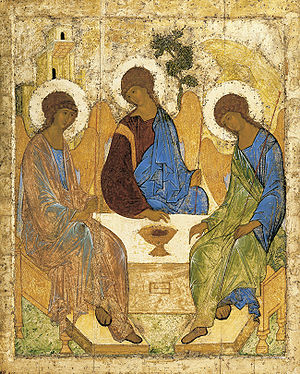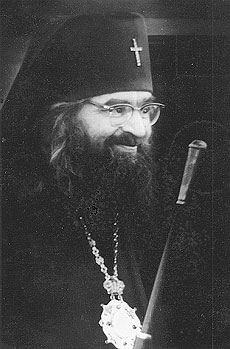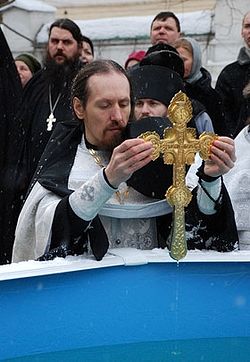Great Blessing of the Waters, Sretensky Monastery. Photo by Anton Pospelov.On Theophany, that is, the Day of the Lord's Baptism, every year a great miracle is performed. The Holy Spirit, coming down upon the water, changes its natural properties. It becomes incorrupt, that is it does not spoil, remains transparent and fresh for many years, receives the grace to heal illnesses, to drive away demons and every evil power, to preserve people and their dwellings from every danger, to sanctify various objects whether for church or home use. Therefore Orthodox Christians with reverence drink Holy Water - a great Agiasma (holy thing), as the Greeks call it.
Showing posts with label ST. JOHN MAXIMOVITCH. Show all posts
Showing posts with label ST. JOHN MAXIMOVITCH. Show all posts
The Cross, the Preserver of the Universe
By St. John Maximovitch
In the prophet Ezekiel (9:6) it is said that when the Angel of the Lord was sent to punish and destroy the sinning people, it was told him not to strike those on whom the “mark” had been made. In the original text this mark is called “tau,” the Hebrew letter corresponding to the letter “T,” which is how in ancient times the cross was made, which then was an instrument of punishment.
And so, even then was foretold the power of the Cross, which preserves those who venerate it. Likewise by many other events in the Old Testament the power of the Cross was indicated. Moses, who held his arms raised in the form of a cross during the battle, gave victory to the Israelites over the Amalekites. He also, dividing the Red Sea by a blow of his rod and by a transverse blow uniting the waters again, saved Israel from Pharaoh, who drowned in the water, while Israel crossed over on the dry bottom (Exodus, Chs. 14, 17).
SERMON ON THE FEAST OF THE TRANSFIGURATION
St. John of Shanghai (Maximovitch)
When He created the world, God said, Let us make man in our image, after our likeness(Gen. 1:26). God’s image manifests in man’s mental capabilities, in his authority over nature, his power, and his ability to create. God’s likeness in man consists in his moral perfection, his spiritual strivings, and in his possibility of attaining sanctity.
God’s image and likeness, in which our fore-parents were created, was fully reflected in them before the fall. Sin disrupted both the former and the latter, although it did not entirely deprive man of them.
ON THE HOLY PENTECOST
SERMON BY ST. JOHN (MAXIMOVICH, +1966) OF SHANGHAI AND SAN FRANCISCO
 The Father, the Son and the Holy Spirit share one nature, one essence, one substance. That is why the Three Faces are the Trinity, one-in-substance. Humans also have one nature, one substance.
The Father, the Son and the Holy Spirit share one nature, one essence, one substance. That is why the Three Faces are the Trinity, one-in-substance. Humans also have one nature, one substance.
But while God is the Indivisible Trinity, divisions occur in mankind constantly… The Father, the Son and the Holy Spirit have common thought, common will, common actions. What the Father desires, the Son also desires, and the Holy Spirit also desires. Whatever the Son loves, so do the Father and the Holy Spirit also love. Whatever is pleasing to the Holy Spirit, is pleasing to the Father and Son. Their actions are also common among them, all act in conjunction and in accord.
St. John of Tobolsk - On Divine Providence
Saint John Maximovich(Met.Of Tobolsk)
Divine Providence
There is nothing random in the world
What is Providence? It is one of the basic characteristics of God – to see all that is going on, was going on, and will be going on in the future as though it is the present, and to have omnipotent concern for safeguarding all creation and wisely managing all its manifestations. St. John Damascene describes it thus: “Providence is Divine will which maintains everything and wisely rules over everything.”
 PASCHAL EPISTLE OF ST. JOHN MAXIMOVITCH, 1940
PASCHAL EPISTLE OF ST. JOHN MAXIMOVITCH, 1940
Pascha, 1940, Shanghai. A large Russian diaspora, forced to leave behind their homeland; many had lost their dear ones, and everything they owned, and now lived in want, in a foreign land. But God gave them a saintly bishop to comfort them, and keep them in remembrance of the grace and strength of Holy Orthodoxy.
A member of St. John’s Shanghai flock, Nicholas Feodorovich Tsepitov, of Revda, Russia, preserved this Pascal Epistle all his life, even after his return to the Soviet Union in 1947. It gave him comfort there also, where more trials awaited him. He gave this epistle for publication to the Fund for the Canonization of St. John Maximovitch in Russia, and we present it here, in English translation, as a comfort to all.
Subscribe to:
Posts (Atom)




